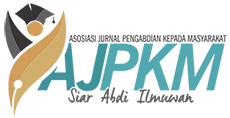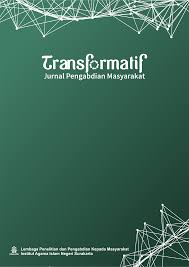FGD Penggunaan Analisis SWOT untuk Menganalisis Karakteristik Raudhatul Athfal dalam Kurikulum Merdeka bagi Aktivis Pejuang Raudhatul Athfal (RA) Indonesia
Main Article Content
Novan Ardy Wiyani Novan
Ria Yuniawati
Siti Sutanti
This community service activity was motivated by the inability of RA teachers to analyze the characteristics of RA in implementing the independent curriculum. The aim is to provide learning services to RA teachers in Indonesia in using SWOT analysis techniques to analyze RA characteristics in an independent curriculum for Indonesian RA activists through FGD activities. Participants in the FGD activity were 36 people. The implementation consists of 5 stages, namely investigation, preparation, implementation, reflection and demonstration. At this investigation stage the author investigates the problem that will be solved through FGD. In the preparation stage the author plans the implementation of FGD activities. At the implementation stage, FGD activities were carried out. At the reflection stage, feedback is provided on the results of the FGD at the implementation stage. At the demonstration stage, it was demonstrated how to describe the characteristics of RA based on the results of a SWOT analysis using a deductive mindset. It can be concluded that the results of the SWOT analysis can be used as material for compiling an analysis of RA characteristics because it describes the various potentials possessed by RA. Then the impact of carrying out this service activity is that the FGD participants have the ability to analyze the characteristics of RA in implementing the independent curriculum using the SWOT analysis technique.
Aaron, T. S., Meyers, C. V., Hitt, D. H., & VanGronigen, B. A. (2022). Principals’ perspectives on the shift to short-cycle school improvement planning. Educational Management Administration & Leadership, 174114322211374. https://doi.org/10.1177/17411432221137462
AlMarwani, M. (2020). Pedagogical potential of SWOT analysis: An approach to teaching critical thinking. Thinking Skills and Creativity, 38, 100741. https://doi.org/10.1016/j.tsc.2020.100741
Bahri, S., & Arafah, N. (2021). Analisis Manajemen SDM Dalam Mengembangkan Strategi Pembelajaran Di Era New Normal. Tafkir: Interdisciplinary Journal of Islamic Education, 1(1), 20–40. https://doi.org/10.31538/tijie.v1i1.2
Cahyaningrum, D. E., & Diana, D. (2023). Proyek Penguatan Profil Pelajar Pancasila sebagai Implementasi Kurikulum Merdeka di Lembaga PAUD. Jurnal Obsesi : Jurnal Pendidikan Anak Usia Dini, 7(3), 2895–2906. https://doi.org/10.31004/obsesi.v7i3.4453
Chen, S.-A., Tangkaratt, V., Lin, H.-T., & Sugiyama, M. (2020). Active deep Q-learning with demonstration. Machine Learning, 109(9–10), 1699–1725. https://doi.org/10.1007/s10994-019-05849-4
Cholilah, M., Tatuwo, A. G. P., Komariah, & Rosdiana, S. P. (2023). Pengembangan Kurikulum Merdeka Dalam Satuan Pendidikan Serta Implementasi Kurikulum Merdeka Pada Pembelajaran Abad 21. Sanskara Pendidikan Dan Pengajaran, 1(02), 56–67. https://doi.org/10.58812/spp.v1i02.110
Fadillah, C. N., & Yusuf, H. (2022). Analisis Kurikulum Merdeka Dalam Satuan Pendidikan Anak Usia Dini. JURNAL BUNGA RAMPAI USIA EMAS, 8(2), 120. https://doi.org/10.24114/jbrue.v8i2.41596
Franco, P., & Yang, Y. (Nicole). (2021). Exiting fieldwork “with grace”: Reflections on the unintended consequences of participant observation and researcher-participant relationships. Qualitative Market Research: An International Journal, 24(3), 358–374. https://doi.org/10.1108/QMR-07-2020-0094
García-Rico, L., Martínez-Muñoz, L. F., Santos-Pastor, M. L., & Chiva- Bartoll, O. (2021). Service-learning in physical education teacher education: A pedagogical model towards sustainable development goals. International Journal of Sustainability in Higher Education, 22(4), 747–765. https://doi.org/10.1108/IJSHE-09-2020-0325
Hasibuan, R., Fitri, R., Maureen, I. Y., & Pratiwi, A. P. (2022). PENYUSUNAN KURIKULUM OPERASIONAL PADA SATUAN PAUD BERBASIS KURIKULUM MERDEKA. Transformasi Dan Inovasi : Jurnal Pengabdian Masyarakat, 2(2), 87–92. https://doi.org/10.26740/jpm.v2n2.p87-92
Indrizal, E. (2014). DISKUSI KELOMPOK TERARAH. Jurnal Antropologi: Isu-Isu Sosial Budaya, 16(1), 75. https://doi.org/10.25077/jantro.v16.n1.p75-82.2014
Kumar Basak, S., Wotto, M., & Bélanger, P. (2018). E-learning, M-learning and D-learning: Conceptual definition and comparative analysis. E-Learning and Digital Media, 15(4), 191–216. https://doi.org/10.1177/2042753018785180
Lazarides, R., Watt, H. M. G., & Richardson, P. W. (2020). Teachers’ classroom management self-efficacy, perceived classroom management and teaching contexts from beginning until mid-career. Learning and Instruction, 69, 101346. https://doi.org/10.1016/j.learninstruc.2020.101346
Lobe, B., Morgan, D., & Hoffman, K. A. (2020). Qualitative Data Collection in an Era of Social Distancing. International Journal of Qualitative Methods, 19, 160940692093787. https://doi.org/10.1177/1609406920937875
Longhurst, G. J., Stone, D. M., Dulohery, K., Scully, D., Campbell, T., & Smith, C. F. (2020). Strength, Weakness, Opportunity, Threat (SWOT) Analysis of the Adaptations to Anatomical Education in the United Kingdom and Republic of Ireland in Response to the Covid‐19 Pandemic. Anatomical Sciences Education, 13(3), 301–311. https://doi.org/10.1002/ase.1967
McDougle, L. M., & Li, H. (2023). Service-Learning in Higher Education and Prosocial Identity Formation. Nonprofit and Voluntary Sector Quarterly, 52(3), 611–630. https://doi.org/10.1177/08997640221108140
Miles, M. B., Huberman, A. M., & Saldana, J. (2018). Qualitative Data Analysis (Fourth Edition). Sage.
Puyt, R., Lie, F. B., De Graaf, F. J., & Wilderom, C. P. M. (2020). Origins of SWOT Analysis. Academy of Management Proceedings, 2020(1), 17416. https://doi.org/10.5465/AMBPP.2020.132
Wardhani, M. kusuma. (2020). SERVICE LEARNING MAHASISWA GURU SEBAGAI BENTUK PENGABDIAN KEPADA MASYARAKAT di YAYASAN SOSIAL EDUKATIF TANGERANG. Prosiding Konferensi Nasional Pengabdian Kepada Masyarakat Dan Corporate Social Responsibility (PKM-CSR), 3, 672–679. https://doi.org/10.37695/pkmcsr.v3i0.754
Yang, W., & Li, H. (2022). The role of culture in early childhood curriculum development: A case study of curriculum innovations in Hong Kong kindergartens. Contemporary Issues in Early Childhood, 23(1), 48–67. https://doi.org/10.1177/1463949119900359











